(完整版)初中英语8种时态练习及答案
初中八种英语时态精讲精练(含答案)
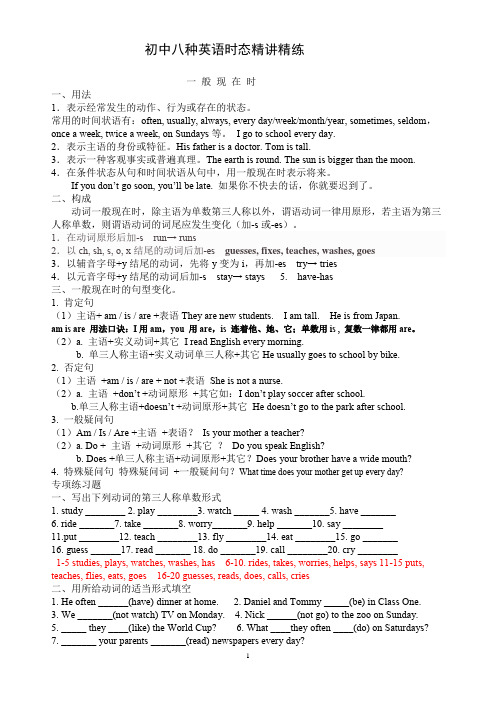
初中八种英语时态精讲精练一般现在时一、用法1.表示经常发生的动作、行为或存在的状态。
常用的时间状语有:often, usually, always, every day/week/month/year, sometimes, seldom,once a week, twice a week, on Sundays等。
I go to school every day.2.表示主语的身份或特征。
His father is a doctor. Tom is tall.3.表示一种客观事实或普遍真理。
The earth is round. The sun is bigger than the moon. 4.在条件状态从句和时间状语从句中,用一般现在时表示将来。
If you don’t go soon, you’ll be late. 如果你不快去的话,你就要迟到了。
二、构成动词一般现在时,除主语为单数第三人称以外,谓语动词一律用原形,若主语为第三人称单数,则谓语动词的词尾应发生变化(加-s或-es)。
1.在动词原形后加-s run→ runs2.以ch, sh, s, o, x结尾的动词后加-es guesses, fixes, teaches, washes, goes3.以辅音字母+y结尾的动词,先将y变为i,再加-es try→ tries4.以元音字母+y结尾的动词后加-s stay→ stays 5. have-has三、一般现在时的句型变化。
1. 肯定句(1)主语+ am / is / are +表语They are new students. I am tall. He is from Japan.am is are 用法口诀:I用am,you 用are,is 连着他、她、它;单数用is , 复数一律都用are。
(2)a. 主语+实义动词+其它I read English every morning.b. 单三人称主语+实义动词单三人称+其它He usually goes to school by bike.2. 否定句(1)主语+am / is / are + not +表语She is not a nurse.(2)a. 主语+don’t +动词原形+其它如:I don’t pla y soccer after school.b.单三人称主语+doesn’t +动词原形+其它He doesn’t go to the park after school.3. 一般疑问句(1)Am / Is / Are +主语+表语?Is your mother a teacher?(2)a. Do + 主语+动词原形+其它?Do you speak English?b. Does +单三人称主语+动词原形+其它?Does your brother have a wide mouth?4. 特殊疑问句特殊疑问词+一般疑问句?What time does your mother get up every day?专项练习题一、写出下列动词的第三人称单数形式1. study ________2. play ________3. watch _____4. wash _______5. have _______6. ride _______7. take _______8. worry_______9. help _______10. say ________11.put ________12. teach ________13. fly ________14. eat ________15. go _______16. guess ______17. read _______ 18. do _______19. call ________20. cry ________1-5 studies, plays, watches, washes, has 6-10. rides, takes, worries, helps, says 11-15 puts, teaches, flies, eats, goes 16-20 guesses, reads, does, calls, cries二、用所给动词的适当形式填空1. He often ______(have) dinner at home.2. Daniel and Tommy _____(be) in Class One.3. We _______(not watch) TV on Monday.4. Nick ______(not go) to the zoo on Sunday.5. _____ they ____(like) the World Cup?6. What ____they often ____(do) on Saturdays?7. _______ your parents _______(read) newspapers every day?8. The girl _______(teach) us English on Sundays.9. She and I ________(take) a walk together every evening.10. The moon ________ (travel) round the earth.11. It usually ________ (take) me more than two hours to finish my homework.12. I will tell him the good news as soon as he ________ (come) back.13. Miss Gao is very busy. She ________ (sleep) six hours a day.14. Look! Susan ________ (dance) in the garden. She often ________ (dance) there.15. The children will go to the Summer Palace if it ________ (not rain) tomorrow.16. I _________ any pears (not have). But Mary _________ some (have).17. What language ____ you _____? (speak) 18. My brother _____ to be a scientist. (not like) 19. We ______ Japanese at school. (not study) 20. He _____ playing football. (not like)1. has2. are3. don’t have4. doesn’t go5. Do like6. do, do7. Do, read8. teaches9. take 10. travels 11. takes 12. comes 13. sleeps 14. is dancing, dances 15. doesn’t rain 16. don’t have, has 17. do, speak 18. doesn’t like 19. don’t study 20. doesn’t like三、按照要求改写句子1. Daniel watches TV every evening.(改为否定句)_________________________2. I do my homework every day.(改为一般疑问句,并作肯、否定回答)________________________________________________________3. Amy likes playing computer games.(改为一般疑问句,并作肯、否定回答)___________________________________________________4. We go to school every morning.(改为否定句)____________________________5. Sun Yang usually washes some clothes on Saturday.否定句: _____________ 一般疑问句: ________________ 划线提问: ____________6. Tom does his homework at home.否定句: ______________ 一般疑问句: ____________ 划线提问_____________1. Daniel doesn’t watch TV every evening.2. Do you do your homework every day? Yes, I do. No, I don’t.3. Does Amy like playing computer games? Yes, she does. No, she doesn’t.4. We don’t go to school every morning.5. Sun Yang doesn’t usually wash any clothes on Saturday. Does Sun Yang usually wash any clothes on Saturday? What does Sun Yang usually do on Saturday?6. Tom doesn’t do his homework at home. Does Tom do his homework at home? Where does Tom do his homework?四、选用所给的词语适当形式填空give, rain, enjoy, sing, return, borrow, keep1. It often ______ in my hometown in summer.2. Sometimes the birds _______ in the tree.3. Joe usually ____ books from the school library, but she never _____ them on time.4. May I ________ the dictionary for a week?5. The little boy ________ himself in the garden on Saturdays.6. Mary is a good girl. She often ________ me a hand when I need some help.1. rains2. sing3. borrows, returns4. keep5. enjoys6. gives一般过去时的用法一、定义:表示过去某一时间所发生的动作或存在的状态;表示在过去一段时间内,经常性或习惯性的动作。
初中八种动词时态-练习题及标准答案

一、一般现在时:练习题1. We often______ (play) in the playground.2. He _____ (get) up at six o’clock.3. _____you ______ (brush) your teeth every morning.4. What (do) ______he usually (do) ______ after school?5. Danny _____ (study) English, Chinese, Maths, Science and Art an school.6. Mike sometimes ________ (go) to the park with his sister.7. At eight at night, she __________ (watch) TV with his parents.8. ________ Mike________ (read) English every day?9. How many lessons_________ your classmate________ (have) on Monday?10. What time_________ his mother_________ (do) the housework?11. He never _____ a hat in winter.(wear)12.The machine ______ smoothly.(run)13.knowledge _______ power (be)14.Time and tide ______ for no ma.(wait)改句子1. Do you often play football after school? (肯定回答)2. I have many books. (改为否定句)3. Gao Shan’s sister likes playing table tennis (改为否定句)4. She lives in a small town near New York. (改为一般疑问句)5. I watch TV every day. (改为一般疑问句)6. David has got a goal. (改为一般疑问句)7. We have four lessons.(否定句)8. Nancy doesn’t run fast (肯定句)9. My dog runs fast.否定句:一般疑问句:10. Mike has two letters for him.一般疑问句:否定句:11. I usually play football on Friday afternoon.否定句:二、一般过去时:练习题练习题一1. Tom and Mary ___________ (come) to China last month.2. Mike _________________(not go) to bed until 12 o’clock last night. So he _______ (get ) up late.3. Mary __________ (read) English yesterday morning.4. There _________ (be) no one here a moment ago.5. I ___________ (call) Mike this morning.6. I listened but ___________ (hear) nothing.7. Tom ___________ (begin) to learn Chinese last year.8. Last week we _________ (pick) many apples on the farm.9. My mother ________________ (not do) housework yesterday.10. She watches TV every evening. But she _______________ (not watch) TV last night.11.________ your father ________ ( go ) to work every day last year?12. —What time _______ you _______ (get) to Beijing yesterday?—We __________ (get) to Beijing at 9:00 in the evening.13.What __________ (make) him cry (哭) just now?14. Last year the teacher ___________ (tell) us that the earth moves around the sun.15. There ____________ a telephone call for you just now. (be)16. There __________ not enough people to pick apples that day. (be)17.There _____________ any hospital (医院) in my hometown (家乡) in 1940. ( be not)18. There ____________ enough milk at home last week, wasn’t there?19. Eli ____________ to Japan last week. ( move)20. –When _______ you _________ (come) to China? - Last year.21. Did she ________ (have) supper at home?22. Jack ____________ (not clean) the room just now.23. _________ (be) it cold in your city yesterday?24. How many people ________ (be) there in your class last term?25. It ________ (be) hot yesterday and most children _______ (be) outside.26. There ________ (be) a football match on TV yesterday evening, but I_________ (have) no time to watch it.27. He ate some bread and _________ (drink) some milk.28. ________ he __________ (finish) his homework last night?29. I__________(be) tired yesterday.30. I ___________(gain ) Arts degree last year.31. What _________ you ___________ (do) last night?32. My grandfather _________ (leave) Hong Kong for New York in 1998.33. What _______ he ________ (do) yesterday?34. Last week I _______ (buy) a new bike.35. He ________ (be) here just now.36. He __________ (not find ) his key last night.37. My father __________ (drink) a lot of wine yesterday.38. ________ you ________ (finish) your homework yesterday?39. I ________ (eat) some eggs and bread this morning.40. Her mother __________ (not give) the girl any present.练习题二过去时练习:写出下列动词的过去式is\am_________ fly_______ plant________ are________ drink_________play_______ go________ make ________does_________ dance________worry________ ask _____ taste_________ eat__________draw________put ______ throw________ kick_________ pass_______ do________一、用be动词的适当形式填空。
初中英语语法-八种时态详解与练习
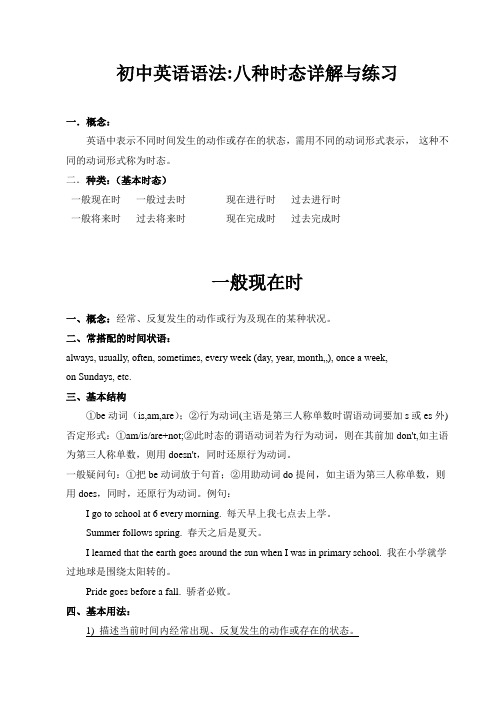
初中英语语法:八种时态详解与练习一.概念:英语中表示不同时间发生的动作或存在的状态,需用不同的动词形式表示,这种不同的动词形式称为时态。
二.种类:(基本时态)一般现在时一般过去时现在进行时过去进行时一般将来时过去将来时现在完成时过去完成时一般现在时一、概念:经常、反复发生的动作或行为及现在的某种状况。
二、常搭配的时间状语:always, usually, often, sometimes, every week (day, year, month…), once a week,on Sundays, etc.三、基本结构①be动词(is,am,are);②行为动词(主语是第三人称单数时谓语动词要加s或es外) 否定形式:①am/is/are+not;②此时态的谓语动词若为行为动词,则在其前加don't,如主语为第三人称单数,则用doesn't,同时还原行为动词。
一般疑问句:①把be动词放于句首;②用助动词do提问,如主语为第三人称单数,则用does,同时,还原行为动词。
例句:I go to school at 6 every morning. 每天早上我七点去上学。
Summer follows spring. 春天之后是夏天。
I learned that the earth goes around the sun when I was in primary school. 我在小学就学过地球是围绕太阳转的。
Pride goes before a fall. 骄者必败。
四、基本用法:1) 描述当前时间内经常出现、反复发生的动作或存在的状态。
在这种情景中,句子常带有表示频率的时间状语:always , everyday , often , once a week (month , year , etc.) , sometimes , seldom , usually等等,以表示句中的动作或状态是习惯性的、经常性的。
初中英语八大时态练习试题及答案(详解)
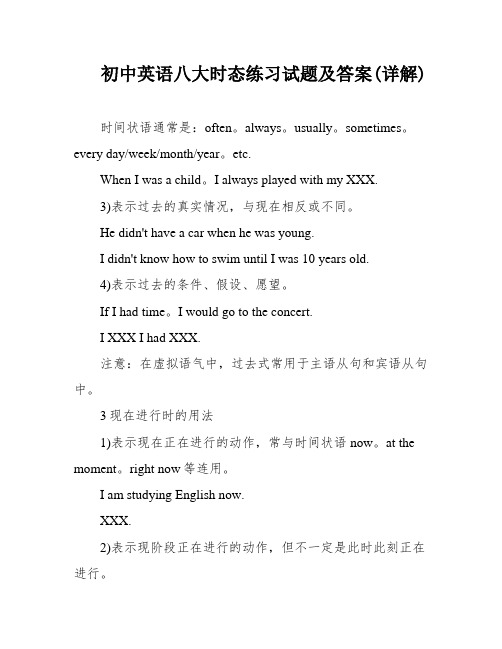
初中英语八大时态练习试题及答案(详解)时间状语通常是:often。
always。
usually。
sometimes。
every day/week/month/year。
etc.When I was a child。
I always played with my XXX.3)表示过去的真实情况,与现在相反或不同。
He didn't have a car when he was young.I didn't know how to swim until I was 10 years old.4)表示过去的条件、假设、愿望。
If I had time。
I would go to the concert.I XXX I had XXX.注意:在虚拟语气中,过去式常用于主语从句和宾语从句中。
3现在进行时的用法1)表示现在正在进行的动作,常与时间状语now。
at the moment。
right now等连用。
I am studying English now.XXX.2)表示现阶段正在进行的动作,但不一定是此时此刻正在进行。
He is learning Chinese this semester.XXX.注意:现在进行时表示的动作必须是正在进行的,而不是已经完成的或惯性的动作。
4过去进行时的用法1)表示过去某一时刻正在进行的动作。
I was watching TV when she called me.They were having dinner at 7 o'clock last night.2)表示过去某段时间内正在进行的动作。
I was XXX.He was working on the project for two weeks.注意:过去进行时强调的是动作的持续性和进行性,常与表示过去的时间状语连用。
5一般将来时的用法1)表示将来某一时刻要发生的动作或存在的状态。
I will go to the beach XXX.She will be 30 years old next month.2)表示将来经常性或惯性的动作。
初中英语八大时态练习试题及答案(详解)

初中英语八大时态练习试题及答案(详解)1一般现在时的用法1) 表示经常性或习惯性的动作,常与表示频度的时间状语连用。
例: every…, sometimes,ofen,always,usually, twice a week, at…, on Sunday等。
I leave home for school at 7 every morning.He watches Tv once a week .2) 表示普遍真理,客观存在,科学事实。
The earth moves around the sun.Shanghai lies in the east ofChina.3) 格言或警句。
Pride goes before a fall. 骄者必败。
注意:此用法如果出现在宾语从句中,即使主句是过去时,从句谓语也要用一般现在时。
例:Columbus proved that the earth is round..4) 表示现在时刻的状态、能力、个性或爱好。
I don't want so much.Ann Wang writes good English but does not speak well.比较:Now I put the sugar in the cup.I am doing my homework now.第一句用一般现在时,用于操作演示或指导说明的示范性动作,表示言行的瞬间动作。
再如:Now watch me, I switch on the current and stand back.第二句中的now是进行时的标志,表示正在进行的动作的客观状况,所以后句用一般现在时。
2一般过去时的用法1)在确定的过去时间里所发生的动作或存在的状态。
时间状语有:yesterday, an hour ago, the other day, in 1982,yesterday morning (afternoon, evening…),last night (week, month, year…), a moment ago , a week ago, three years ago…just now,等。
初中英语八大时态练习题(含答案).ppt

A. don't think/ don't
B. aren't thinking /aren't
C. don't think /do
D. aren't thinking/ are
24. She always ______ something whenever she ______.
A .studied /played
C. knocked /was doing
D. knock/ am doing
40. The boy_____ English on the radio when I _____ his door.
A. learned/ was opening
B. was learning /opened
C. learned /opened
A. goes/doesn't
B. goes/isn't
C. doesn't go/does
D. doesn't go/is
11.He usually _____ TV on Sunday evening.
A. watch B. watches C. watching
D. is watching
12. We'll go to play with snow if it ______ tomorrow.
C. go/ am going
D. am going/am going
22. Look, they______ a good time, ____ they ?
A. have/ do
B. have/don't
C. are having/are
初中英语八种时态详解及练习
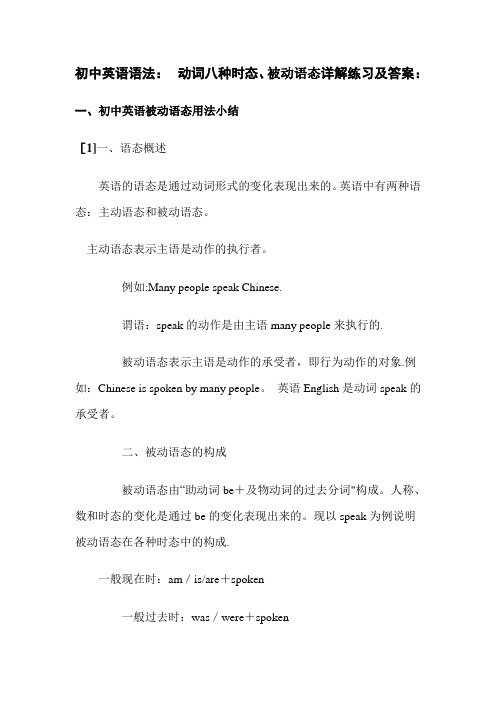
初中英语语法:动词八种时态、被动语态详解练习及答案:一、初中英语被动语态用法小结[1]一、语态概述英语的语态是通过动词形式的变化表现出来的。
英语中有两种语态:主动语态和被动语态。
主动语态表示主语是动作的执行者。
例如:Many people speak Chinese.谓语:speak的动作是由主语many people来执行的.被动语态表示主语是动作的承受者,即行为动作的对象.例如:Chinese is spoken by many people。
英语English是动词speak的承受者。
二、被动语态的构成被动语态由“助动词be+及物动词的过去分词"构成。
人称、数和时态的变化是通过be的变化表现出来的。
现以speak为例说明被动语态在各种时态中的构成.一般现在时:am/is/are+spoken一般过去时:was/were+spoken一般将来时:will/shall be+spoken现在进行时:am/is/are being+spoken过去进行时:was/were being+spoken现在完成时:have/has been+spoken过去完成时:had been + spoken三、被动语态的用法(1)不知道或没有必要说明动作的执行者是谁。
例如:Some new computers were stolen last night.一些新电脑在昨晚被盗了.(不知道电脑是谁偷的)This bridge was founded in 1981。
这座桥竣工于1981年。
(2)强调动作的承受者,而不强调动作的执行者。
例如:The glass was broken by Mike.玻璃杯是迈克打破的。
This book was written by him.这本书是他写的.Your homework must be finished on time.你们的家庭作业必须及时完成。
四、主动语态变被动语态的方法(1)把主动语态的宾语变为被动语态的主语。
(完整版)初中英语八大时态练习题(含答案)

(完整版)初中英语八大时态练习题(含答案) -CAL-FENGHAI-(2020YEAR-YICAI)_JINGBIAN初中英语八大时态练习题1.I will tell him as soon as he _____ backA. comeB. comesC. will comeD. came2. Mary _____ on shoes when she ____ them.A. tries…buysB. tries… buiesC. trys… buysD. trys… buies3. The girl often ______ cold when she ______.A. cathcsdancesB. catches dancesC. catchsdanceesD. catches dancee4. _____ he ____ himself there No, I don't think so.A. DoenjoyB. Does enjoiesC. Does enjoysD. Doesenjoy5. _____ your teacher ____ from them very often Certainly.A. DohearB. DoeshearC. Do receiveD. receive6. _____ your mother _____ some cleaning on SundaysA. DoesdoesB. DodoesC. DoesdoD. Do do7. _____ Tom _____to work hard to help his family Yes, he _____.A. Has xdoesB. HasxdoesC. DoeshashasD. Does havedoes8. Which teacher _____ lessons to you every dayA. does givesB. does giveC. do giveD. gives9. Smith does not go fishing on weekdays, ____ _____ , he does.A. does heNoB. does heYesC. doesn't heNoD. doesn't heYes10.Mr Black often _____ fishing on Sundays, _____ heA. goesdoesn'tB. goesisn'tC. doesn't godoesD. doesn't gois11.He usually _____ TV on Sunday evening.A. watchB. watchesC. watchingD. is watching12. We'll go to play with snow if it ______ tomorrow.A. snowB. snowsC. will snowD. snowed13. Neither I nor he ______ French.A. speakB. doesn't speakC. speaksD. doesn't speak14. Nobody ______ how to run this machines.A . know B. have known C. knows D. is knowing15. The Young Pioneer _____ water for the old man every day.A. carryB. bringC. takesD. carries16. Some are ______ in the river and some are ______ games.A. swimming playingB. swimmingplaiingC. swimming I playingD. swimmingplaing17. Look ! The boy students are _____ football while the girls are _____ .A. playing danceB. playing dancingC. play dancingD. play dance18. He _____ to do his lessons at eight every evening.A. is beginningB. is beginningC. beginD. begins19. _____ he _____ on well with his friends this termA. DoesgetsB. DoesgetC. IsgettingD. Isgeting20. Mr Smith _____ short stories, but he ____ a TV play these days.A. is writingis writingB. is writing writesC. writes is writingD. writes writes参考答案:1—5 BABDB 6—10 CDDBA 11—15 BBCCD 16—20 CBDCC21. I _____ to the cinema. I ______ there every Sunday.A. go…goB. am going… goC. go… am goingD. am going…am going22. Look, they______ a good time, ____ theyA. have…doB. have…don'tC. are having…areD. are having aren't23. You ______ about the future now, ______ youA. don't thinkdon'tB. aren't thinking aren'tC. don't think doD. aren't thinking are24. She always ______ something whenever she ______.A .studiedplayed B. studiedplaiedC.. studiedplaiedD. studied played25. He often _____ late in the forest. It _____ me very much.,A. stayedworriedB. staied worriedC. stayedworryedD. staied worried26. I ______that the boy _____ with no tears in his eyes.A. noticed cryedB. noticed criedC. noticedcriedD. noticed cryed27. We _____the floor and _____ all the windows.A. mopped cleannedB. moped cleanedC. moppedcleanedD. moped cleaned28. When I _____ the Children's Palace, the children _____ with joy.A. visited jumppedB. visited jumpedC. visited jumpedD. visited jumpped29. ______ a sports meet last Sunday Yes , they ______.A. Did they have didB. Did they have hadC. Had they hadD. Had they did30. ____ you _____out for a walk after supper Yes, I ______.A. DidwentwentB. Did go wentC. Did went didD. Did go did31. _____ Jack _____ on with his work or ______ to have a restA. Did went stoppedB. Did go stopC. Did went stopD. Did go stopped32. You gave them a talk two days ago, _____you Yes, I ______.A. did didB. did gaveC. didn't didD. didn't gave33. ____ your brother _____ a letter to My father.A. Who wroteB. WhatwroteC. Who didwriteD. What did write34. They _____ about the TV news then in the sitting-room. They often ____ such talksA. talkedhadB. talkhaveC. were talkinghadD. are talkinghave35. He ______ some cooking at that time, so _____ me.A. did heardB. did didn't hearC. was doing heardD. was doing didn't hear36. " _____ you angry then " "They_ too much noise."A. Arewere makingB. Werewere makingC. AremadeD. Were made37. This time yesterday Jack _____ his, bike. He _____ TV.A. repaired didn't watchB. was repairing watchedC. repaired watchedD. was repairing wasn't watching38. We _____ for Tom at ten last Sunday. He often kept us ______.A. were waiting waitingB. were waiting waitC. waited waitingD. waited wait39. When you _____ at the door, I _____ some washing.A. knocked didB. was knocking didC. knocked was doingD. knock am doing40. The boy_____ English on the radio when I _____ his door.A. learned was openingB. was learning openedC. learned openedD. is learning open参考答案:21-25 BDDDA 26—30 BCBAD 31—35 BCCCD 36—40 BDACB41. When they______ through the forest, a bear _____ at them.A. walked… was comingB. were walking… cameC. were talking… comesD. walk… is coming42. A young man _____ her while she _____ her work .A. watched was finishingB. was watching finishedC. watched finishedD. was watching was finishing43. While mother _____ some washing, I ______ a kite for Kack.A. did madeB. was doing madeC. was doing was makingD. did was making44. I _____ myself French from 7 to 9 yesterday morning. I _____ to work.A. was teaching didn't goB. taught didn't goC. was teaching wentD. taught went45. He _____ a model plane when I came to see him.A. makesB. is makingC. was makingD. made46. I ______ a letter at nine last night.A. is writingB. was writingC. wroteD. is writing47. The teacher_____ (give) us a history lesson when Tom walked into the classroom.A. gaveB. is givingC. was givenD. was giving48. There will be a football match in two days, that is _______.A. last SundayB. next SundayC. every SundayD. this Sunday49. We ______ class meeting this November.A. hadB. haveC. will haveD. are having50. He ______ in his garden every morning next year.A. will workB. worksC. workedD. is working51. Be careful. The train ______.A. will comeB.C. comesD. is coming52. Look at those clouds. It _____ soon, I'm afraid.A. is going to rainB. is rainingC. will rainD. won't rain53. The radio says it ______ the day after tomorrow.A. is going to snowB. is snowingC. will snowD. snows54. _____ he _____ some shopping tomorrow afternoonA. WilldoesB. is going to doC. isdoingD. Shall do55. What day _____ it ______ tomorrow Wednesday.A. is going to beB. willbeC. shallbeD. doesbe56. The boy _______ sixteen years old next year.A. is going to beB. is growing to beC. will beD. is57. _____ you ____ me up at six, pleaseA. Aregoing to wakeB. ArewakingC. WillwakeD. Dowake58. If he ______ to college, he _____ a lot more.A. will gowill learnB. will gois going to learnC. is going is going to learnD. goes will learn59. When she _____ next time ,l ______ her everything.A. is going to comeshall tellB. will comeshall tellC. comeswill tellD. comewill tell60. What day ____ it ____ tomorrow It ____Tuesday.A. is…going to be… isB. will…be…willC. is…going to be…is goingD. will be…will be 参考答案:41-45 BDCAC 46—50 BDDCA 51—55 DACBB 56—60 CCDCD。
初中英语八大时态详细语法解析习题及答案
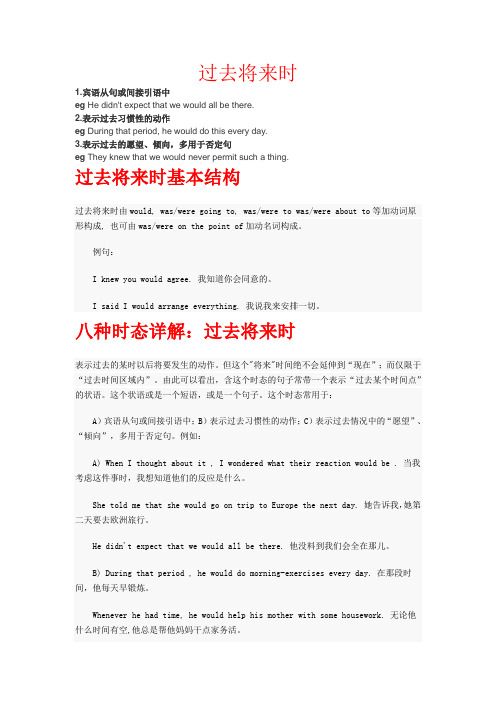
过去将来时1.宾语从句或间接引语中eg He didn't expect that we would all be there.2.表示过去习惯性的动作eg During that period, he would do this every day.3.表示过去的愿望、倾向,多用于否定句eg They knew that we would never permit such a thing.过去将来时基本结构过去将来时由would, was/were going to, was/were to was/were about to等加动词原形构成, 也可由was/were on the point of加动名词构成。
例句:I knew you would agree. 我知道你会同意的。
I said I would arrange everything. 我说我来安排一切。
八种时态详解:过去将来时表示过去的某时以后将要发生的动作。
但这个"将来"时间绝不会延伸到“现在”;而仅限于“过去时间区域内”。
由此可以看出,含这个时态的句子常带一个表示“过去某个时间点”的状语。
这个状语或是一个短语,或是一个句子。
这个时态常用于:A)宾语从句或间接引语中;B)表示过去习惯性的动作;C)表示过去情况中的“愿望”、“倾向”,多用于否定句。
例如:A) When I thought about it , I wondered what their reaction would be . 当我考虑这件事时,我想知道他们的反应是什么。
She told me that she would go on trip to Europe the next day. 她告诉我,她第二天要去欧洲旅行。
He didn't expect that we would all be there. 他没料到我们会全在那儿。
(中考英语资料)初中英语语法八大时态总结(完整版)含答案
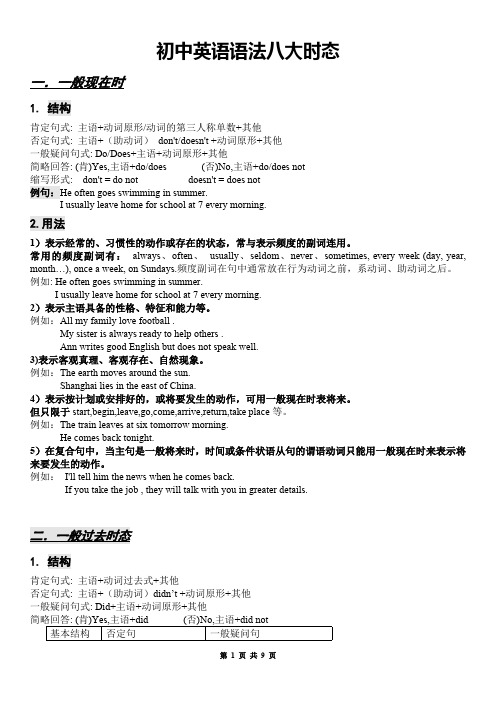
初中英语语法八大时态一.一般现在时1. 结构肯定句式: 主语+动词原形/动词的第三人称单数+其他否定句式: 主语+(助动词)don't/doesn't +动词原形+其他一般疑问句式: Do/Does+主语+动词原形+其他简略回答: (肯)Yes,主语+do/does (否)No,主语+do/does not缩写形式: don't = do not doesn't = does not例句:He often goes swimming in summer.I usually leave home for school at 7 every morning.2.用法1)表示经常的、习惯性的动作或存在的状态,常与表示频度的副词连用。
常用的频度副词有:always、often、usually、seldom、never、sometimes, every week (day, year, month…), once a week, on Sundays.频度副词在句中通常放在行为动词之前,系动词、助动词之后。
例如: He often goes swimming in summer.I usually leave home for school at 7 every morning.2)表示主语具备的性格、特征和能力等。
例如:All my family love football .My sister is always ready to help others .Ann writes good English but does not speak well.3)表示客观真理、客观存在、自然现象。
例如:The earth moves around the sun. Shanghai lies in the east of China.4)表示按计划或安排好的,或将要发生的动作,可用一般现在时表将来。
(完整版)初中英语8种时态练习及答案
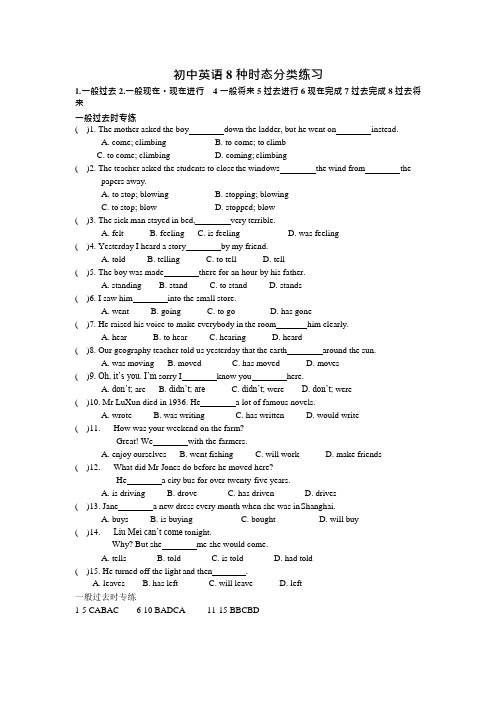
初中英语8 种时态分类练习1.一般过去2.一般现在。
现在进行 4 一般将来5 过去进行6 现在完成7 过去完成8 过去将来一般过去时专练( )1. The mother asked the boy down the ladder, but he went on instead.A. come; climbingB. to come; to climbC. to come; climbingD. coming; climbing( )2. The teacher asked the students to close the windows the wind from the papers away.A. to stop; blowingB. stopping; blowingC. to stop; blowD. stopped; blow( )3. The sick man stayed in bed, very terrible.A. feltB. feelingC. is feelingD. was feeling( )4. Yesterday I heard a story by my friend.A. toldB. tellingC. to tellD. tell( )5. The boy was made there for an hour by his father.A. standingB. standC. to standD. stands( )6. I saw him into the small store.A. wentB. goingC. to goD. has gone( )7. He raised his voice to make everybody in the room him clearly.A. hearB. to hearC. hearingD. heard( )8. Our geography teacher told us yesterday that the earth around the sun.A. was movingB. movedC. has movedD. moves( )9. Oh, it’s you. I’m sorry I know you here.A. don’t; areB. didn’t; areC. didn’t; wereD. don’t; were( )10. Mr LuXun died in 1936. He a lot of famous novels.A. wroteB. was writingC. has writtenD. would write( )11. --- How was your weekend on the farm?--- Great! We with the farmers.A. enjoy ourselvesB. went fishingC. will workD. make friends( )12. --- What did Mr Jones do before he moved here?--- He a city bus for over twenty-five years.A. is drivingB. droveC. has drivenD. drives( )13. Jane a new dress every month when she was in Shanghai.A. buysB. is buyingC. boughtD. will buy( )14. --- Liu Mei can’t come tonight.--- Why? But she me she would come.A. tellsB. toldC. is toldD. had told( )15. He turned off the light and then .A. leavesB. has leftC. will leaveD. left一般过去时专练1-5CABAC 6-10 BADCA 11-15 BBCBD一般现在时与现在进行时专练( ) 1. Father usually his newspaper after dinner.A. readB. readsC. readingD. is reading( ) 2. The Blacks often to the cinema on Saturday evenings.A. goB. goesC. is goingD. are going( ) 3.Look! The boy with his mother in the pool.A. is swimmingB. is swimmingC. are swimmingD. are swiming( ) 4.--- What is Tom doing in the classroom? --- He something on the blackboard.A. drawsB. drawC. is drawingD. are drawing.( ) 5.Old Tom usually up at six and sports in the garden.A. gets, dosB. gets, doesC. get, doesD. gets, do( ) 6. It’s ten o’c lock and Jack still(仍然) his homework.A. is, doB. is, doingC. are, doD. are, doing( ) 7. The waiters to work at five every morning.A. startB. startsC. startingD. are starting( ) 8.I a letter, so I can’t go out with you.A. is writingB. am writingC. am writeingD. am writting( )9.A hundred days quite a long time.A. isB. areC. haveD. has( )10. -- late for the meeting next time. –Sorry, I won’t.A. Don’tB. Don’t beC. Won’t beD. Be not( )11. My mother noodles, but my father .A. likes, doesn’tB. don’t like, doC. likes, didn’tD. didn’t like, do( )12. The picture nice.A. looksB. is lookedC. lookD. is looking( )13. The students will go to the Summer Palace if it tomorrow.A. don’t rainB. doesn’t rainC. won’t rainD. isn’t rain( )14. We are always ready others.A. to helpingB. to helpC. helpD. helping( )15. I often hear her about the boy.A. talkingB. talkC. to talkD. talked( )16. He’s already a little weak in Chinese, he ?A. isB. isn’tC. hasD. hasn’t( )17.Potatoes are in the field by the farmers.A. growB. growingC. grownD. grew( )18. Does she have a watch? – Yes, she .A. haveB. doC. hasD. does( )19. She English very much now.A. is likingB. likesC. likedD. is teaching( )20. She has no paper to . Why not give her some?A. writeB. be writingC. write onD. write in( )21. Does Mr Know-all know keys?A. to makeB. how to makeC. how makeD. making( )22. Does your mother English now?A. teachesB. teachC. taughtD. is teaching( )23. Jack usually mistakes last term. But this term he does better.A. makesB. madeC. doesD. did( )24. The boy is too young, please carefully.A. look after himB. look him afterC. look at himD. look him at ( )25. She you to come to my birthday party.A. hopesB. wishesC. wantD. lets( )26. --Where is Frank now? -- He his bike in the yard.A. fixes upB. fixing upC. is fixing upD. fixed( )27. Bob often his mother with the housework on Sundays.A. helpB. helpingC. helpsD. helped( )28. The students will go to the Summer Palace if it tomorrow.A. don’t rainB. doesn’t rainC. won’t rainD. isn’t rain( )29. If it tomorrow, I will go by car.A. rainB. will rainC. rainsD. would rain( )30. --What a nice garden! –She it every day.A. is cleaningB. has cleanedC. cleansD. clean( )31. --Where is Peter? -- He his homework in the room.A. is doingB. doesC. didD. do( )32. The teacher told us that light much faster than sound.A. travelsB. traveledC. wasD. will be( )33. My mother told us that Taiwan part of China.A. isB. areC. wasD. were( )34. Do you know bananas in Hainan?A. growsB. is grownC. grewD. are grown( )35. The clothes very soft.A. are feltB. are feelingC. feelD. feels( )36. The supermarket is far from Mary’s house. So she only once a week.A. goes shoppingB. has been thereC. was shoppingD. has gone there ( )37. Don’t make so much noise. We to the music.A. are listeningB. listenC. listenedD. have listened( )38. I’ll go swimming with you if I free tomorrow.A. will beB. shall beC. amD. was( )39. – Oh, Mrs. King, your sweater looks nice. Is it wool ?-- Yes, and it’s Inner Mongolia.A. made of, made byB. made of, made inC. made by, made forD. made by, made from一般现在时与现在进行时专练1-5BAACB 6-10BABAB 11-15AABBB 16-20 BCDBC21-25 BBBAC 26-30 CCBAC 31-35 AAABC 36-39 AACB3.一般将来时专练( )1. Her hope the 2008 Olympic Games.A. to take part inB. is to take part inC. taking part inD. will take part in( )2. --- Can I go to Beijing for my holiday, Dad? --- You can when you a bit older.A. will getB. getC. are gettingD. got( )3. If he harder, he will catch up with us soon.A. studyB. studiesC. will studyD. studied( )4. --- Don’t forget to ask him to write to me.--- I won’t. As soon as he , I’ll ask him to write to you.A. will comeB. cameC. comesD. is coming( )5. --- Jimmy is leaving for a holiday.--- Really? Where he ?A. has; goneB. will; goC. did; goD. would; go( )6. Frank to see his grandma if he free tomorrow.A. will come; will beB. comes; isC. will come; isD. comes; will be( )7. There a talk on science in our school next Monday.A. will giveB. will beC. is going to giveD. is( )8. --- Shall we go shopping now?--- Sorry, I can’t. I my shirts.A. washB. washesC. washedD. am washing( )9. I believe that those mountains with trees in a few years’ time.A. are coveredB. will be coveredC. are coveringD. will cover( )10. It is said that about 400 cars in the factory next month.A. were producedB. will produceC. are producedD. will be produced( )11. --- Are you free this afternoon?--- No. I’ll have an English composition this afternoon.A. to writeB. wroteC. to be writingD. to be written( )12. --- Come back home every month.--- I .A. willB. mustC. shouldD. can( )13. A robot think of itself; it be told what to do.A. can’t; mustB. couldn’t; canC. may not; willD. mustn’t, may一般将来时专练1-5 BBBCB 6-10 CBDBD 11-13 AAA4.过去进行时专练二、用动词的适当形式填空。
初中英语时态练习题及答案

初中英语时态练习题及答案1. I have finished my homework. (一般现在时)2. She was reading a book when I arrived. (过去进行时)3. They will go to the park tomorrow. (一般将来时)4. The sun rises in the east. (一般现在时)5. He had finished his homework before I got home. (过去完成时)6. We were having dinner when the phone rang. (过去进行时)7. If it rains tomorrow, we will stay at home. (条件句中的一般现在时)8. She has been to Paris three times. (现在完成进行时)9. They were going to the cinema when it started to rain. (过去进行时)10. I will have finished my project by the end of this week. (将来完成时)答案1. 正确。
使用现在完成时表示动作已经完成。
2. 正确。
使用过去进行时表示过去某个时间正在进行的动作。
3. 正确。
使用一般将来时表示将来的动作或状态。
4. 正确。
使用一般现在时表示自然现象或普遍真理。
5. 正确。
使用过去完成时表示在过去某个时间点之前已经完成的动作。
6. 正确。
使用过去进行时表示过去某个时间正在进行的动作。
7. 正确。
在条件句中,如果主句是将来时,从句使用一般现在时。
8. 正确。
使用现在完成进行时表示从过去开始一直持续到现在的动作。
9. 正确。
使用过去进行时表示过去某个时间正在进行的动作。
10. 正确。
使用将来完成时表示将来某个时间点之前会完成的动作。
初中英语八大时态练习题(含答案).ppt

A. goes/doesn't
B. goes/isn't
C. doesn't go/does
D. doesn't go/is
11.He usually _____ TV on Sunday evening.
A. watch B. watches C. watching
D. is watching
12. We'll go to play with snow if it ______ tomorrow.
3. The girl often ______ cold when she ______.
A. cathcs /dances
B. catches/ dances
C. catchs /dancees
D. catches /dancee
4. _____ he ____ himself there ?No, I don't think so.
9. Smith does not go fishing on weekdays, ___ ? ____ , he does.
A. does he/No B. does he/Yes C. doesn't he/No D. doesn't he/Yes
10.Mr Black often _____ fishing on Sundays, _____ he ?
A. swiming /playing
B. swimming / plaiing
C. swimming / playing
D. swimming / plaing
17. Look ! The boy students are ___ football while the girls are ___ .
[全]初中英语八种时态专项练习 (附答案)
![[全]初中英语八种时态专项练习 (附答案)](https://img.taocdn.com/s3/m/df68323e4afe04a1b071def2.png)
初中英语八种时态专项练习(附答案)一般现在时、一般过去时、一般将来时、过去将来时、现在进行时、过去进行时、现在完成时、过去完成时1. The population of the world ____ still ____ now.A. has; grownB. is; growingC. will; growD. is; grown2. ---Good evening. I _____ to see Miss Mary.---Oh, good evening. I’m sorry, but she is not in.A. have comeB. comeC. cameD. had come3. —It’s time for dinner. Where is your father, Emma?— He _____ his bike in the yard.A. cleanB. cleanedC. is cleaningD. will clean4. If you _____ carefully, you ______ the report well.A. will listen; will be understoodB. will listen; understandC. listen; will understandD. listen; understand5. They ______ about eight hundred English words by the end of last term.A. will learnB. had learnedC. are going to learnD. have learned6. —How did the accident happen?—You know, it ______ difficult to see the road clearly because it.A. was; was rainingB. is; has rainedC. is; is rainingD. will be; will rain7. Attention, please. There _____ a football game between China and Korea this evening.A. is going to beB. has beenC. hasD. will have8. —What does your sister like doing in her spare time?—She _____ watching TV.A. likesB. likedC. has likedD. had liked9.—When ____ Jessy ____ to New York?—Yesterday.A. does; getB. did; getC. has; gotD. had; got10. —How clean the bedroom is!—Yes, I am sure that someone it.A. cleansB. cleanedC. has cleanedD. had cleaned11. My friend ______ me. I have to leave now.A. waits forB. waited forC. is waiting forD. was waiting for12. Be sure to let Tom know the notice as soon as he ______.A. will arriveB. was arrivingC. arrivesD. arrived13. I ______ the wrong thing. Can I use your eraser?A. writeB. wroteC. am writingD. will write14. ---Are you going to help John with his Chinese this evening?---NO, He ______ to England. He will be back next month.A. returnedB. has returnedC. returnsD. will return15. ---Who’s won the first prize in the competition?---Henry______. He has ______ it for a week.A. is, wonB. is, gotC. has, hadD. has, been given16. ---Is this the place that you ______ ?---No. I’ve never been there before.A. have visitedB. will visitC. are visitingD.would visit17. It ______ outside. You’d better take an umbrella with you.A. rainsB. is rainingC. rainedD. has rained18. ---Can I help you?---I bought this watch here yesterday, but it ______ work.A. won’tB. didn’tC. doesn’tD. wouldn’t19. I used to love this film when I was young, but I ______ it that way any more.A. don’t feelB. didn’t feelC. haven’t feltD. hadn’t felt20. ---How was your trip to the ancient village?---Fantastic! We ___________to a museum of strange stones.A. go B. went C. are going D. will go21. —Where is Peter?—He ______ volleyball with his friends in the school gym.A. playsB. playedC. is playingD.was playing22. ---Hello! Can I speak to Mr. White?---Sorry, he isn’t here right now. He ______ to the theme park.A. will goB. was goingC. has goneD. has been23. ---______ you ______ your drawing?---Not yet! It will be done in a few minutes.A. Did; finishB. Will; finishC. Do; finishD. Have; finished24. She ______ as an animal trainer since 2003.A. has workedB. worksC. will workD. have worked25. They ______ her to the party, so she was very happy.A. inviteB. invitedC. will inviteD. are inviting26. Mr. Green ______ to the manager now. You’d better call him later.A. talkB. talkedC. is talkingD. was talking27. Prison Break is the best American TV play that I ______ these years.A. watchB. will watchC. have watchedD. was watching28. ---Alice, turn down the TV, please. I _________ on the phone.---Oh, sorry.A. have talkedB. talkedC. am talkingD. talk29. --- Where are the Greens, may I ask?--- Well, they ______ to England. They have been there for nearly a week now.A. have beenB. are going toC. have goneD. will go30.The teachers_______ the office for a few minutes when we arrived. We didn’t meet them.A. had been away fromB. had leftC. have been away fromD. have left1-5BBCCB 6-10AAABC 11-15CCBBC 16-20ABCAB21-25CCDAB 26-30CCCCA。
初中英语八大时态讲解及练习(含答案)
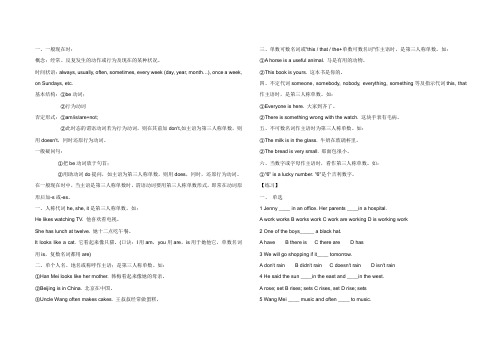
一、一般现在时:概念:经常、反复发生的动作或行为及现在的某种状况。
时间状语:always, usually, often, sometimes, every week (day, year, month…), once a week, on Sundays, etc.基本结构:①be动词;②行为动词否定形式:①am/is/are+not;②此时态的谓语动词若为行为动词,则在其前加don't,如主语为第三人称单数,则用doesn't,同时还原行为动词。
一般疑问句:①把be动词放于句首;②用助动词do提问,如主语为第三人称单数,则用does,同时,还原行为动词。
在一般现在时中,当主语是第三人称单数时,谓语动词要用第三人称单数形式,即常在动词原形后加-s或-es。
一、人称代词he, she, it是第三人称单数。
如:He likes watching TV. 他喜欢看电视。
She has lunch at twelve. 她十二点吃午餐。
It looks like a cat. 它看起来像只猫。
(口诀:I用am,you用are,is用于她他它,单数名词用is,复数名词都用are)二、单个人名、地名或称呼作主语;是第三人称单数。
如:①Han Mei looks like her mother. 韩梅看起来像她的母亲。
②Beijing is in China. 北京在中国。
③Uncle Wang often makes cakes. 王叔叔经常做蛋糕。
三、单数可数名词或"this / that / the+单数可数名词"作主语时,是第三人称单数。
如:①A horse is a useful animal. 马是有用的动物。
②This book is yours. 这本书是你的。
四、不定代词someone, somebody, nobody, everything, something等及指示代词this, that 作主语时,是第三人称单数。
中考英语八大时态精解+精练+答案

中考英语八大时态精解+精练+答案一、一般现在时1、概念:表示经常发生的情况;有规律出现的情况;总是发生的;事实真理。
2.时间状语:Always, usually, often, sometimes, every week (day, year, month…), once a week (day, year, month…), on Sundays (on Mondays…), etc.3.基本结构:主语+动词原形(如主语为第三人称单数,动词上要改为第三人称单数形式)4.否定形式:主语+am / is / are+not+其他;此时态的谓语动词若为行为动词,则在其前加don't,如主语为第三人称单数,则用doesn't,同时还原行为动词。
5.一般疑问句:把be 动词放于句首;用助动词do 提问,如主语为第三人称单数,则用does,同时,还原行为动词。
eg:①It seldom snows here. 这里很少下雪。
②He is always ready to help others. 他总是乐于帮助别人。
③Action speaks louder than words. 事实胜雄辩。
二、一般过去时1.概念:过去某个时间里发生的动作或状态;过去习惯性、经常性的动作、行为。
2.时间状语:ago,yesterday,the day before yesterday,last week,last (year,night,month…), in 1989, just now, at the age of 5, one day, long long ago, once upon a time,etc.3.基本结构:主语+动词的过去式或be 的过去式+名词4.否定形式:主语+was / were+not+其他;在行为动词前加didn't,同时还原行为动词。
5.一般疑问句:was 或were 放于句首;用助动词do 的过去式did 提问,同时还原行为动词。
初中英语8种时态练习及答案五篇

初中英语8种时态练习及答案五篇第一篇:初中英语8种时态练习及答案初中英语8种时态练习1.The mother asked the boy _______ down the ladder, but he went on _______ e;climbingB.to come;to climbC.to come;climbinging;climbing2.Yesterday I heard a story _______ by my friend.A.toldB.tellingC.to tellD.Tell3.Father usually ______ his newspaper after dinner.A.readB.readsC.readingD.is reading4.Look!The boy ______ with his mother in the pool.A.is swimmingB.is swimmingC.are swimmingD.are swimming5.The picture ______ nice.A.looksB.is lookedC.lookD.is looking6.--What a nice garden!–She ______ it every day.A.is cleaningB.has cleanedC.cleansD.clean7.--Where is Frank now?--He ______ his bike in the yard.A.fixes upB.fixing upC.is fixing upD.fixed8.If he _______harder, he will catch up with us soon.A.studyB.studiesC.will studyD.studied9.---Jimmy is leaving for a holiday.---Really? Where _______ he _______?A.has;goneB.will;goC.did;goD.would;go10.How long have you _______ here?eB.gotC.arrivedD.been11.The Smiths _______ in China for 8 years.A.has livedB.livedC.have beenD.live12.--Do you know Lydia very well?--Yes, She and I _____ friends since we were very young.A.have madeB.have becomeC.have beenD.have turned13.It seems that the old man _________something important.A.has lostB.had lostC.lostD.would lose14.We _________the work by six yesterday evening.A.finishedB.would finishC.had finishedD.had been finished15.When I reached home, my parents __________their supper.A.are havingB.have already hadC.have hadD.had already had第二篇:初中英语时态练习题及答案英语五大时态练习题(一般现在、一般过去、过去将来、现在进行、现在完成)1.You ________about the future now, ________you? A.don't think, don't B.aren't thinking, aren't C.don't think, do D.aren't thinking, are2.Charlie____here next month.A.isn’t working B.doesn’t working C.isn’t going to working D.won’t work3.—Did the thieves _____ into the car? —No, they______.A.fell, didn’t B.fall(落下), did C.jump(跳), didn’t D.jump, did4.____ she _____ this dictionary in the bookshop nearby last week? A.Did, buy B.Does, buy C.Did, bought D.Does, buys5.How ________ ____ Mr.Brown ___________ to America? A.do,go B.is,go C.does,go D.does,goes6.-When did May come back from Hong Kong?-She _D_ from Hong Kong last e back es back C.returned back D.came back7.There____a meeting tomorrow afternoon.A.will be going to B.will going to be C.is going to be D.will go to be8.-Mum, may I go out and play basketball?-____ __you______ your homework yet? A.Do;finish B.Are;finishingC.Did;finishD.Have;finished9.He_____very busy this week,he______free next week.A.will be;is B.is;is C.will be;will be D.is;will be 10.---Is your father a doctor?---Yes, he is.He ______ in T own Hospital.A.has worked B.isworking C.wor ks D.worked 11.Where’s my camera? I___________ it.A.am not finding B.am not seeing C.can’t find D.can’t look at 12.—____he ____ his lunch? —Yes, he did.A.Does ,has B.Does, have C.Did, have D.Did, had 13.Where is the morning paper?–I______if for you at once.A.get B.am getting C.to get D.will get14.Physics _____ much harder than English, I think.A.are B.is C.wasD.were 15.How __________ he go to work? He ___________ to work by bike A.does go B.do;goes C.do go D.does;goes 16.-Have you ever______Lintong to see the Terra Cotta Warriors?-Yes, I have.A.went to B.gone to C.been in D.been to 17.Look.they _________ a good time, _________ they? A.have, do B.have, don't C.are having, are D.are having, aren't 18.There____a dolphin show in the zoo tomorrow evening.A.was B.is going to have C.will haveD.is going to be19.Mr.Yang ________ English this term.A.teaches our B.teaches us C.teachs us D.teach our 20.–_______you_______free tomorrow?–No.I________free the day after tomorrow.A.Are;going to;will B.Are;going to be;will C.Are;going to;will be D.Are;going to be;will be 21.I_____a letter from him since he left.A.didn't receive B.haven't got C.didn't have D.haven't heard 22.Listen!They _______ in the next room.A.sing B.is singing C.are singing D.were singing 23.—What _____ you _______ last week? —I bought a bag.A.did ,buy B.did , bought C.do, buy D.do, bought 24.My parents ______ Shangdong for ten years.A.have been in B.have been to C.have gone to D.have been 25.______ you usually late for school? No, _____________.A.Do I am B.Does not C.Are I’m not D.Are I aren’t 26.---Mary, could you help me?---Wait a moment.I ____.A.read a book B.did my homework C.was watching TV D.am cooking dinner.27.–Shall I buy a cup of tea for you?–____.(不,不要。
初中英语时态练习题及答案

初中英语时态练习题及答案1. (一般现在时) I ___ (go) to school at 7:00 every morning.答案: go2. (一般过去时) She ___ (visit) her grandparents last weekend.答案: visited3. (一般将来时) We ___ (have) a birthday party next Sunday.答案: will have4. (现在进行时) Look! The children ___ (play) in the park.答案: are playing5. (过去进行时) What ___ (do) you ___ (do) at this time yesterday?答案: were, doing6. (将来进行时) By this time tomorrow, I ___ (be) ___ (study) for my math test.答案: will be, studying7. (现在完成时) They ___ (already/finish) their homework.答案: have already finished8. (过去完成时) When I got to the cinema, the movie ___ (already/start).答案: had already started9. (将来完成时) By the end of this year, he ___ (travel) to10 different countries.答案: will have traveled10. (现在完成进行时) She ___ (teach) English for five years.答案: has been teaching答案解析1. 一般现在时表示习惯性的动作或状态,用动词原形或第三人称单数形式。
初中英语8种时态练习及答案

初中英语8种时态分类练习1.一般过去2.一般现在。
现在进行4一般将来5过去进行6现在完成7过去完成8过去将来一般过去时专练()1.Themotheraskedtheboy_______downtheladder,buthewenton_______instead.e;climbingB.tocome;toclimbC.tocome;climbinging;climbing()2.Theteacheraskedthestudentstoclosethewindows_______thewindfrom_______thepapersaway.A.tostop;blowingB.stopping;blowing()14.---LiuMeican’tcometonight.---Why?Butshe_______meshewouldcome.A.tellsB.toldC.istoldD.hadtold()15.Heturnedoffthelightandthen_______.A.leavesB.hasleftC.willleaveD.left一般过去时专练1-5CABAC6-10BADCA11-15BBCBD一般现在时与现在进行时专练()1.Fatherusually______hisnewspaperafterdinner.A.readB.readsC.readingD.isreading()2.TheBlacksoften______tothecinemaonSaturdayevenings.A.goB.goesC.isgoingD.aregoing()3.Look!Theboy______withhismotherinthepool.A.isswimmingB.isswimmingC.areswimmingD.areswiming()4.---WhatisTomdoingintheclassroom?---He______somethingontheblackboard.A.drawsB.drawC.isdrawingD.aredrawing.()5.OldTomusually______upatsixand______sportsinthegarden.A.gets,dosB.gets,doesC.get,doesD.gets,do()6.It’steno’clockandJack______still(仍然)______hishomework.A.is,doB.is,doingC.are,doD.are,doing()7.Thewaiters______toworkatfiveeverymorning.()20.Shehasnopaperto_____.Whynotgivehersome?A.writeB.bewritingC.writeonD.writein( )21.DoesMrKnow-allknow______keys?A.tomakeB.howtomakeC.howmakeD.making()22.Doesyourmother______Englishnow?A.teachesB.teachC.taughtD.isteaching()23.Jackusually______mistakeslastterm.Butthistermhedoesbetter.A.makesB.madeC.doesD.did()24.Theboyistooyoung,please______carefully.A.lookafterhimB.lookhimafterC.lookathimD.lookhimat()25.She______youtocometomybirthdayparty.A.hopesB.wishesC.wantD.lets()26.--WhereisFranknow?--He______hisbikeintheyard.A.fixesupB.fixingupC.isfixingupD.fixed()27.Boboften______hismotherwiththehouseworkonSundays.A.helpB.helpingC.helpsD.helped()28.ThestudentswillgototheSummerPalaceifit______tomorrow.A.don’trainB.doesn’trainC.won’trainD.isn’train()29.Ifit_____tomorrow,Iwillgobycar.A.rainB.willrainC.rainsD.wouldrain()30.--Whatanicegarden!–She______iteveryday.()39.–--3.()1.Herhope_______the2008OlympicGames.A.totakepartinB.istotakepartinC.takingpartinD.willtakepartin()2.---CanIgotoBeijingformyholiday,Dad?---Youcanwhenyou_______abitolder.A.willgetB.getC.aregettingD.got()3.Ifhe_______harder,hewillcatchupwithussoon.A.studyB.studiesC.willstudyD.studied()4.---Don’tforgettoaskhimtowritetome.---Iwon’t.Assoonashe_______,I’llaskhimtowritetoyou.A.willcomeB.cameesD.iscoming()5.---Jimmyisleavingforaholiday.---Really?Where_______he_______?A.has;goneB.will;goC.did;goD.would;go()6.Frank_______toseehisgrandmaifhe_______freetomorrow.A.willcome;willbees;isC.willcome;ises;willbe()7.There_______atalkonscienceinourschoolnextMonday.A.willgiveB.willbeC.isgoingtogiveD.is()8.---Shallwegoshoppingnow?---Sorry,Ican’t.I_______myshirts.A.washB.washesC.washedD.amwashing()9.Ibelievethattho semountains_______withtreesinafewyears’time.---4.二、??s.芭蕾舞演员9.Itwasquitelateatnight.George__________(read)andAmy__________(ply)herneedlewhenthey_ _________(hear)aknockatthedoor.10.There__________(be)agrouproundthefirewhenthey__________(reach)it.Anoldwoman_______ ___(sit)onthegroundnearthekettle;twosmallchildren__________(lie)nearher;adonkey______ ____(bend)hisheadoveratallgirl.1.I_____(have)mybreakfastathalfpastsixyesterdaymorning.2.Mary_____(go)overherlessonsfromsixtosevenlastnight.Johnandpeter____(do)thesamething .3.What_____you___(do)atthattime???We_____(watch)TV.4.Wasyourfatherathomeyesterdayevening?Yes,hewas.He_____(listen)totheradio.5.They_____(notmake)amodelshipwhenIsawhim.6._____they____(have)ameetingat4yesterdayafternoon?No,they_____.They_____(clean)theclassroom.7.______it______(rain)whenyouleftschool??Yes,it____.(No,it____)8.What_____yourfather_____(do)whenhewasyourage?9.Oneday,Edison_____(wait)foratraintoarrive,andsuddenlyalittleboyrantothetrack(轨道)toplay.10.HeaskedmeifI______(go)fishingthatafternoon.11.Thethreeofthemwereinahurrybecausetheirplane_____(leave)infiveminutes.12.Inaletter,johntoldusthathe_____(come)tochinanextmonth.13.Whenthebellrang,jenny_____(wait)inherseat.答案:二、选择题。
- 1、下载文档前请自行甄别文档内容的完整性,平台不提供额外的编辑、内容补充、找答案等附加服务。
- 2、"仅部分预览"的文档,不可在线预览部分如存在完整性等问题,可反馈申请退款(可完整预览的文档不适用该条件!)。
- 3、如文档侵犯您的权益,请联系客服反馈,我们会尽快为您处理(人工客服工作时间:9:00-18:30)。
初中英语8 种时态分类练习1.一般过去2.一般现在。
现在进行 4 一般将来5 过去进行6 现在完成7 过去完成8 过去将来一般过去时专练( )1. The mother asked the boy down the ladder, but he went on instead.A. come; climbingB. to come; to climbC. to come; climbingD. coming; climbing( )2. The teacher asked the students to close the windows the wind from the papers away.A. to stop; blowingB. stopping; blowingC. to stop; blowD. stopped; blow( )3. The sick man stayed in bed, very terrible.A. feltB. feelingC. is feelingD. was feeling( )4. Yesterday I heard a story by my friend.A. toldB. tellingC. to tellD. tell( )5. The boy was made there for an hour by his father.A. standingB. standC. to standD. stands( )6. I saw him into the small store.A. wentB. goingC. to goD. has gone( )7. He raised his voice to make everybody in the room him clearly.A. hearB. to hearC. hearingD. heard( )8. Our geography teacher told us yesterday that the earth around the sun.A. was movingB. movedC. has movedD. moves( )9. Oh, it’s you. I’m sorry I know you here.A. don’t; areB. didn’t; areC. didn’t; wereD. don’t; were( )10. Mr LuXun died in 1936. He a lot of famous novels.A. wroteB. was writingC. has writtenD. would write( )11. --- How was your weekend on the farm?--- Great! We with the farmers.A. enjoy ourselvesB. went fishingC. will workD. make friends( )12. --- What did Mr Jones do before he moved here?--- He a city bus for over twenty-five years.A. is drivingB. droveC. has drivenD. drives( )13. Jane a new dress every month when she was in Shanghai.A. buysB. is buyingC. boughtD. will buy( )14. --- Liu Mei can’t come tonight.--- Why? But she me she would come.A. tellsB. toldC. is toldD. had told( )15. He turned off the light and then .A. leavesB. has leftC. will leaveD. left一般过去时专练1-5CABAC 6-10 BADCA 11-15 BBCBD一般现在时与现在进行时专练( ) 1. Father usually his newspaper after dinner.A. readB. readsC. readingD. is reading( ) 2. The Blacks often to the cinema on Saturday evenings.A. goB. goesC. is goingD. are going( ) 3.Look! The boy with his mother in the pool.A. is swimmingB. is swimmingC. are swimmingD. are swiming( ) 4.--- What is Tom doing in the classroom? --- He something on the blackboard.A. drawsB. drawC. is drawingD. are drawing.( ) 5.Old Tom usually up at six and sports in the garden.A. gets, dosB. gets, doesC. get, doesD. gets, do( ) 6. It’s ten o’c lock and Jack still(仍然) his homework.A. is, doB. is, doingC. are, doD. are, doing( ) 7. The waiters to work at five every morning.A. startB. startsC. startingD. are starting( ) 8.I a letter, so I can’t go out with you.A. is writingB. am writingC. am writeingD. am writting( )9.A hundred days quite a long time.A. isB. areC. haveD. has( )10. -- late for the meeting next time. –Sorry, I won’t.A. Don’tB. Don’t beC. Won’t beD. Be not( )11. My mother noodles, but my father .A. likes, doesn’tB. don’t like, doC. likes, didn’tD. didn’t like, do( )12. The picture nice.A. looksB. is lookedC. lookD. is looking( )13. The students will go to the Summer Palace if it tomorrow.A. don’t rainB. doesn’t rainC. won’t rainD. isn’t rain( )14. We are always ready others.A. to helpingB. to helpC. helpD. helping( )15. I often hear her about the boy.A. talkingB. talkC. to talkD. talked( )16. He’s already a little weak in Chinese, he ?A. isB. isn’tC. hasD. hasn’t( )17.Potatoes are in the field by the farmers.A. growB. growingC. grownD. grew( )18. Does she have a watch? – Yes, she .A. haveB. doC. hasD. does( )19. She English very much now.A. is likingB. likesC. likedD. is teaching( )20. She has no paper to . Why not give her some?A. writeB. be writingC. write onD. write in( )21. Does Mr Know-all know keys?A. to makeB. how to makeC. how makeD. making( )22. Does your mother English now?A. teachesB. teachC. taughtD. is teaching( )23. Jack usually mistakes last term. But this term he does better.A. makesB. madeC. doesD. did( )24. The boy is too young, please carefully.A. look after himB. look him afterC. look at himD. look him at ( )25. She you to come to my birthday party.A. hopesB. wishesC. wantD. lets( )26. --Where is Frank now? -- He his bike in the yard.A. fixes upB. fixing upC. is fixing upD. fixed( )27. Bob often his mother with the housework on Sundays.A. helpB. helpingC. helpsD. helped( )28. The students will go to the Summer Palace if it tomorrow.A. don’t rainB. doesn’t rainC. won’t rainD. isn’t rain( )29. If it tomorrow, I will go by car.A. rainB. will rainC. rainsD. would rain( )30. --What a nice garden! –She it every day.A. is cleaningB. has cleanedC. cleansD. clean( )31. --Where is Peter? -- He his homework in the room.A. is doingB. doesC. didD. do( )32. The teacher told us that light much faster than sound.A. travelsB. traveledC. wasD. will be( )33. My mother told us that Taiwan part of China.A. isB. areC. wasD. were( )34. Do you know bananas in Hainan?A. growsB. is grownC. grewD. are grown( )35. The clothes very soft.A. are feltB. are feelingC. feelD. feels( )36. The supermarket is far from Mary’s house. So she only once a week.A. goes shoppingB. has been thereC. was shoppingD. has gone there ( )37. Don’t make so much noise. We to the music.A. are listeningB. listenC. listenedD. have listened( )38. I’ll go swimming with you if I free tomorrow.A. will beB. shall beC. amD. was( )39. – Oh, Mrs. King, your sweater looks nice. Is it wool ?-- Yes, and it’s Inner Mongolia.A. made of, made byB. made of, made inC. made by, made forD. made by, made from一般现在时与现在进行时专练1-5BAACB 6-10BABAB 11-15AABBB 16-20 BCDBC21-25 BBBAC 26-30 CCBAC 31-35 AAABC 36-39 AACB3.一般将来时专练( )1. Her hope the 2008 Olympic Games.A. to take part inB. is to take part inC. taking part inD. will take part in( )2. --- Can I go to Beijing for my holiday, Dad? --- You can when you a bit older.A. will getB. getC. are gettingD. got( )3. If he harder, he will catch up with us soon.A. studyB. studiesC. will studyD. studied( )4. --- Don’t forget to ask him to write to me.--- I won’t. As soon as he , I’ll ask him to write to you.A. will comeB. cameC. comesD. is coming( )5. --- Jimmy is leaving for a holiday.--- Really? Where he ?A. has; goneB. will; goC. did; goD. would; go( )6. Frank to see his grandma if he free tomorrow.A. will come; will beB. comes; isC. will come; isD. comes; will be( )7. There a talk on science in our school next Monday.A. will giveB. will beC. is going to giveD. is( )8. --- Shall we go shopping now?--- Sorry, I can’t. I my shirts.A. washB. washesC. washedD. am washing( )9. I believe that those mountains with trees in a few years’ time.A. are coveredB. will be coveredC. are coveringD. will cover( )10. It is said that about 400 cars in the factory next month.A. were producedB. will produceC. are producedD. will be produced( )11. --- Are you free this afternoon?--- No. I’ll have an English composition this afternoon.A. to writeB. wroteC. to be writingD. to be written( )12. --- Come back home every month.--- I .A. willB. mustC. shouldD. can( )13. A robot think of itself; it be told what to do.A. can’t; mustB. couldn’t; canC. may not; willD. mustn’t, may一般将来时专练1-5 BBBCB 6-10 CBDBD 11-13 AAA4.过去进行时专练二、用动词的适当形式填空。
